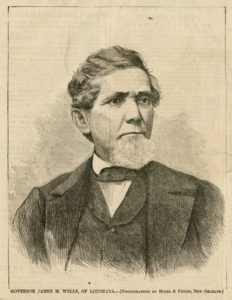James Madison Wells
Alexandria native James Wells served as governor of Louisiana from 1865 until 1867, leading the state's initial efforts at Reconstruction.

Courtesy of The Historic New Orleans Collection
James Madison Wells. Moses & Piffet (Photographer)
Alexandria native James Wells served as governor of Louisiana from 1865 until 1867, leading the state’s initial efforts at Reconstruction. After serving as lieutenant governor under Michael Hahn, Wells assumed the office when Hahn was named to the U.S. Senate. Though Wells owned several plantations and numerous slaves, he opposed secession and remained loyal to the Union before and during the war, unlike most “scalawags” who supported the Union only after the South’s loss. Despite his loyalty to the Union, Wells advocated a relatively lenient approach to former Confederates—a position that ultimately brought him into conflict with Northern reformers.
James Madison Wells was born on New Hope Plantation, near Alexandria, on January 8, 1808, the son of Samuel Levi Wells and Mary Elizabeth Calvit Wells. He attended a Jesuit school in Bardstown, Kentucky; Captain Partridge’s Military School in Middletown, Connecticut; and the Cincinnati School of Law in Ohio. After returning to New Orleans in 1830, he married Mary Ann Scott with whom he had thirteen children.
Originally a Whig, Wells was elected lieutenant governor with the support of both the radical and moderate factions of the Free State Party, a forerunner of the Louisiana Republican Party, in 1864. After serving under Governor Michael Hahn for about a year, Wells advanced to the governorship when Hahn transitioned to the U.S. Senate in 1865. After the war officially ended, Wells called for a new election so that Louisianans could chose their own leaders. Winning reelection in 1865, he set about the task of organizing the state’s recovery efforts.
Despite Wells’ Union loyalties, he favored a relatively lenient approach to Reconstruction, one that allowed former Confederates to be elected and appointed in the hopes that they would provide leadership from within the state. Like many former Confederates, Wells opposed suffrage for newly-freed slaves, a position that many Northern observers criticized. Ultimately, friction with Union leaders cost Wells his job. After a particularly violent riot took place in New Orleans in July 1866, Northern leaders criticized Wells for failing to prevent the deaths of more than thirty African Americans, as well injuries to many citizens of both races. The following summer General Philip H. Sheridan removed Wells from office under the provisions of the Military Reconstruction Act of 1867.
After Wells left office, President Ulysses S. Grant appointed him surveyor of the Port of New Orleans and he later served as president of the Louisiana Returning Board, which reviewed election results. He died on his plantation, Sunnyside, on February 18, 1899, and was interred in Rapides Parish Cemetery in Pineville.
Adapted from Sue Eakin’s entry for the Dictionary of Louisiana Biography, a publication of the Louisiana Historical Association in cooperation with the Center for Louisiana Studies at the University of Louisiana, Lafayette.
Sources: Walter Grieves Cowan and Jack McGuire, Louisiana Governors: Rulers, Rascals and Reformers, (2008) G. M. G. Stafford, The Wells Family and Allied Families (1942); G. M. G. Stafford,Three Pioneer Families of Rapides Parish (1946).
